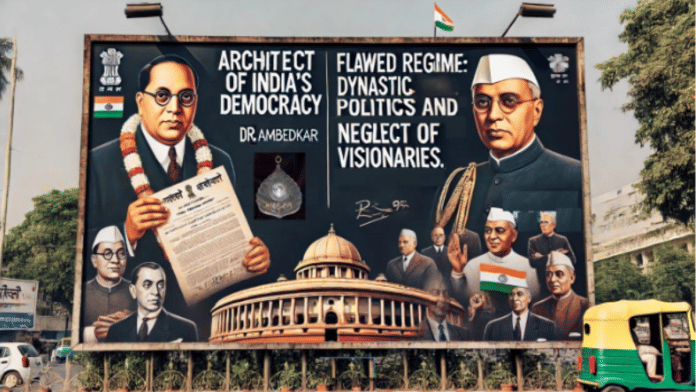Thank you dear subscribers, we are overwhelmed with your response.
Your Turn is a unique section from ThePrint featuring points of view from its subscribers. If you are a subscriber, have a point of view, please send it to us. If not, do subscribe here: https://theprint.in/subscribe/
Dr. B.R. Ambedkar’s life and legacy stand as a testament to his unwavering dedication to justice, equality, and nation-building. His contributions to India’s constitutional framework, economic policy, and social reforms have cemented his place as one of the greatest architects of modern India. Yet, under the Nehruvian regime, his efforts were often sidelined, and recognition for his monumental contributions came only posthumously by Opposing Leaders to the Nehruvian Congress Party of India, reflecting the flawed priorities of Jawaharlal Nehru’s governance. This essay explores Ambedkar’s greatness and the contrasting legacy of Nehru, marked by favoritism, missed opportunities, and dynastic glorification.
Ambedkar’s greatness lies in his relentless struggle for social justice. Born into a Dalit family, he overcame systemic discrimination to rise as a scholar, lawyer, economist, and reformer. As the chief architect of the Indian Constitution, he enshrined principles of liberty, equality, and fraternity, laying the foundation for a democratic and inclusive India. Ambedkar championed the cause of the marginalized, introducing provisions for affirmative action to uplift Scheduled Castes and Scheduled Tribes. His vision extended beyond caste, encompassing issues such as labor rights, women’s emancipation, and economic equality. Ambedkar’s emphasis on education as a tool for empowerment and his conversion to Buddhism as a rejection of caste hierarchies highlight his radical and transformative approach to social change.
Despite his towering contributions, Ambedkar faced systemic neglect under Nehru’s leadership. After serving as India’s first Law Minister, Ambedkar resigned in 1951, disillusioned by the lack of support for the Hindu Code Bill, which aimed to reform and secularize Hindu personal laws. Nehru’s inability—or unwillingness—to rally sufficient political backing for the bill underscored his cautious approach to social reform, prioritizing political stability over transformative change. Ambedkar’s resignation speech reflected his frustration with the regime’s tokenistic approach to addressing the deep-seated inequalities plaguing Indian society.
Adding to the neglect, Ambedkar was denied timely recognition for his contributions. While Nehru awarded himself the Bharat Ratna in 1955 and his daughter Indira Gandhi awarded it to herself in 1971 during her tenure as Prime Minister, Ambedkar’s Bharat Ratna came only in 1990, decades after his death, by PM V.P, Singh. This stark disparity in recognition reflects the Nehruvian regime’s priorities, which favored self-aggrandizement and dynastic glorification over equitable acknowledgment of national heroes. Nehru’s and his daughter’s decision to name countless public institutions, roads, and awards after themselves and family members further entrenched this legacy, overshadowing the contributions of figures like Ambedkar.
The neglect extended beyond symbolic recognition to policy and governance. Ambedkar’s vision for economic self-reliance, outlined in his proposals for industrialization and water resource management, was largely ignored by Nehru, who favored a socialist model influenced by Soviet-style central planning. Ambedkar’s warning about the dangers of excessive state control and his emphasis on decentralization went unheeded, leading to inefficiencies that hampered India’s economic growth. His prescient critique of Nehru’s foreign policy, particularly the handling of India’s borders and relations with China, proved accurate in the wake of the 1962 Sino-Indian War. As a proud son of parents, Dr. J. K. Sharma and Dr. Nishi Sharma, who played a crucial role in indirectly saving India during the 1962 Sino-Indian War, alongside the strategic influence of Dr. John Kenneth Galbraith, as US Ambassador to India, with US President JFK, which I wrote about in OpIndia, I carry forward their legacy of courage and resilience.
The Nehruvian regime’s approach to nation-building also betrayed a tendency to prioritize symbolic gestures over substantive reforms. Nehru’s visits to the tomb of Babur during his trips to Kabul, while neglecting the nearby tomb of the Hindu king Prithviraj Chauhan, reflect a pattern of selective historical emphasis. This preference alienated large sections of the population, particularly Hindus and Sikhs, who felt excluded from the national narrative. Similarly, the decision to cede key Sikh religious sites, such as the Kartarpur Sahib gurdwara, to Pakistan during Partition negotiations remains a contentious issue. While some argue that geopolitical constraints influenced these decisions, others see them as indicative of a broader pattern of neglecting non-Muslim communities.
In conclusion, Dr. Ambedkar’s greatness lies in his transformative vision and unwavering commitment to justice, while Nehru’s flawed regime underscores the limitations of a leadership style that prioritized dynastic glorification over equitable nation-building. Recognizing Ambedkar’s contributions is not just a matter of historical justice but a reminder of the principles that should guide India’s future. Ambedkar’s life and work remain a beacon for those striving to build a more just, inclusive, and progressive India.
Bio: Akshay Sharma is a Media and Tech consultant, an engineer, ex-Gartner analyst, and board member of Somy Ali’s No More Tears. He writes on issues of national importance, aiming to shed light on the intricate connections that shape our society. His opinions are personal.
These pieces are being published as they have been received – they have not been edited/fact-checked by ThePrint.


